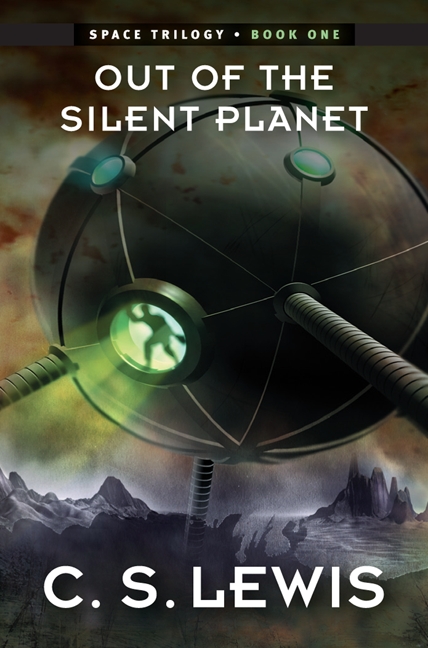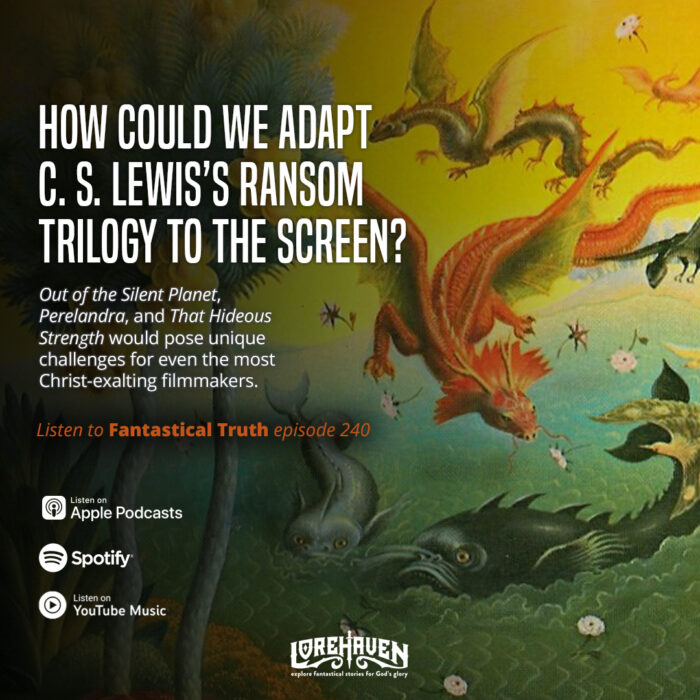240. How Could We Adapt C. S. Lewis’s Ransom Trilogy for the Screen?
Podcast: Play in new window | Download (Duration: 1:21:22 — 75.8MB) | Embed
Nov. 29 was C. S. Lewis’s birthday. The famous author and scholar was born 126 years ago in 1898. And while fans eagerly await whatever director Greta Gerwig and Netflix might do with Narnia, we decided to ask: how would we take Lewis’s other fantasy tales, the Ransom Trilogy, to adapt for the screen?
Episode sponsors
- Enclave Publishing: Memoria by J. J. Fischer
- Laurie Christine: Garden of Mysteries: A Dragon Slayer Bible Story
- The Jabin Kainos series by Vince Mancuso
Mission update
- Lorehaven Onscreen: Wicked Part 1 Honors the Weak, Not the Woke
- Subscribe free to get updates and join the Lorehaven Guild

Yes, many know the series as the Space Trilogy. But some scholar-fans (Stephen included) believe that term contradicts a key theme of Lewis’s world.
Quotes and notes
- BBC releasing a radio dramatization of the Space Trilogy
- The Devil Went Down to Venus: Lessons from the Un-Man, Bethel McGrew
- Life on the Silent Planet: Essays on Christian Living from C.S. Lewis’s Ransom Trilogy
1. How on Mars to adapt Out of the Silent Planet?
2. How on Venus could we adapt Perelandra?
3. How on Earth to adapt That Hideous Strength?
Com station
How would you adapt C. S. Lewis’s Ransom Trilogy for the screen?
Next on Fantastical Truth
‘Tis the season for Christmas stories and stories fans claim are Christmas stories. Which ones have aged for every season? And which ones could be safely left back in childhood when we thought they were fun? In our next episode, let’s open the spiced eggnog, celebrate the best, and boo the rest.































May I express a controversial opinion?
I think the Ransom books are the weakest works of fiction C. S. Lewis wrote. Out of the Silent Planet and Perelandra have some really good dialogue scenes (at the beginning of Silent Planet and in the middle of Perelandra) but a lot of them is just a bunch of description with hardly anything happening and, eh, I’ve read better descriptions by Lewis.
That Hideous Strength has a great cast of villains. I wish I could love the book as a whole. I’ve tried to love it. But I just find a lot of it clunky, especially the stuff with the heroes. And that’s a problem when a book is trying hard to convey how much better it is to be one of the heroes than the villains. To an unusual extent for Lewis, this book keeps telling me what to feel without making me feel it. It’s almost like he wrote an outline for a book.
I think something this podcast episode mentioned is very telling. That Hideous Strength is mostly popular with “theological dude bros” (Sorry, if I’m misremembering the phrase) e.g. people who already agree (broadly anyway) with C. S. Lewis’s perspective. The Chronicles of Narnia and Till We Have Faces can be enjoyed by readers even if they don’t totally agree with the worldview behind them. I can’t imagine, say, a feminist reading That Hideous Strength with anything other than disgust, never mind being converted by it. (If anyone knows or has heard of people who disagree with Lewis on the natural order of the world but still enjoy That Hideous Strength, I’d be really interested in hearing about them. I don’t mean that as a challenge; I honestly do think it would be really interesting.) Maybe the problem is that Lewis saw the poetic appeal of hierarchy so clearly and couldn’t see the poetic appeal of egalitarianism at all.
Having said all that, adapting the Ransom Trilogy makes infinitely more sense than Boxen. LOL.
Expressed well, plus read and engaged near the end of tomorrow’s episode. Thank ye!
I’ve been wanting to read these books for a while. They’re pretty hard to come by around here, but I’ve found them at my state library, so mid next year, after I’ve finished the latest Stormlight Brick by Brandon Sanderson, I’ll be jumping in. I was really enjoying listening to this podcast, but decided to put it on hold so I don’t get too many spoilers for the books. But, you’ve made me even hungrier to read them, so mission accomplished, right?
Really enjoyed this episode!
One challenge that wasn’t addressed was translating Lewis’s writing style to film. Especially in “Out of the Silent Planet” and “Perelandra,” Ransom is alone for much of the story. I imagine it would be challenging to reveal his internal struggles to the viewer without having him narrate aloud to himself. 🙂 I think “That Hideous Strength” would be easier in that regard–while long passages are devoted to the characters’ thoughts, there are generally other characters around they could voice those thoughts to.
As far as the Lady’s nudity goes, I wonder if that could be circumvented by never showing her full body? Her head and shoulders, arms, legs, or hair-covered back could be shown, while still retaining some level of modesty. Perhaps that would still be awkward for the actress because of the implication of nudity. (Even though Ransom is nude for much of the story, I don’t think viewers would have a problem with him simply wearing typical English clothes–it doesn’t feel unnatural the same way it would for the Lady, since Ransom is from a fallen world.)